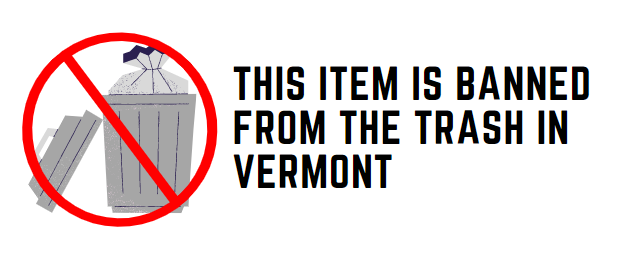ELECTRONIC WASTE
DISPOSAL INFO
It is illegal to put most electronic waste in the trash in Vermont. Electronics contain toxic metals such as lead, mercury, and cadmium that need to be managed responsibly, as well as resource intensive materials that should be recovered and recycled.
Electronic devices are accepted at LRSWMD Johnson, Morrisville, and Stowe stations.
Some electronic devices are fully covered by Vermont’s E-Cycles program. Others are still banned from the landfill but disposal is not free. Tune in here to learn more.
CLICK HERE for a list of covered and non-covered electronic devices.
COST
FREE DISPOSAL: Covered devices (up to 7 items. 8+ items - $5 each)
$1 EACH - Non-covered devices
The Vermont E-Cycles statute provides for free for covered entities. The law has been in place since 2011.
Click here for more info on the E-Cycles Program.
REDUCE, REUSE, RECYCLE
Consider donating your used computer/laptop to ReSource in Hyde Park. Need help with a computer problem? They also have a repair shop, which may be able to help you. Click here to learn more.
Buying refurbished is a great way to support electronics recycling and promote a circular economy.
Tips for shopping for refurbished products:
If you’re shopping for a new computer, phone, speaker, or any other electronic device, see if your preferred manufacturer or retailer has a certified refurbished program. There are a lot of places you can buy refurbished products; often, you can even buy them as CERTIFIED refurbished from a reputable seller or the manufacturer themselves, which may let you get the same warranty as you would any new product.
Electronic waste is the fastest growing component of waste. In 1970, most households had only 1 TV and 0 computers. Now, the average home has two TV’s and at least one computer. In 2008, 1.6 million pounds of electronics were recycled in Vermont. In 2015 the number climbed to more than 4.6 million pounds recycled!
DATA SECURITY: Are you worried about leaving data on your computer when recycling it? It’s up to you to remove any sensitive data from your computer before disposing of it.
If you would like to purchase data security services, take a look at the list of data security providers around the state.
If you’d like to do it yourself, there are two basic ways to destroy your data: physically break the hard drive disks, or permanently erase it using disk wiping software. Click here to learn more.
